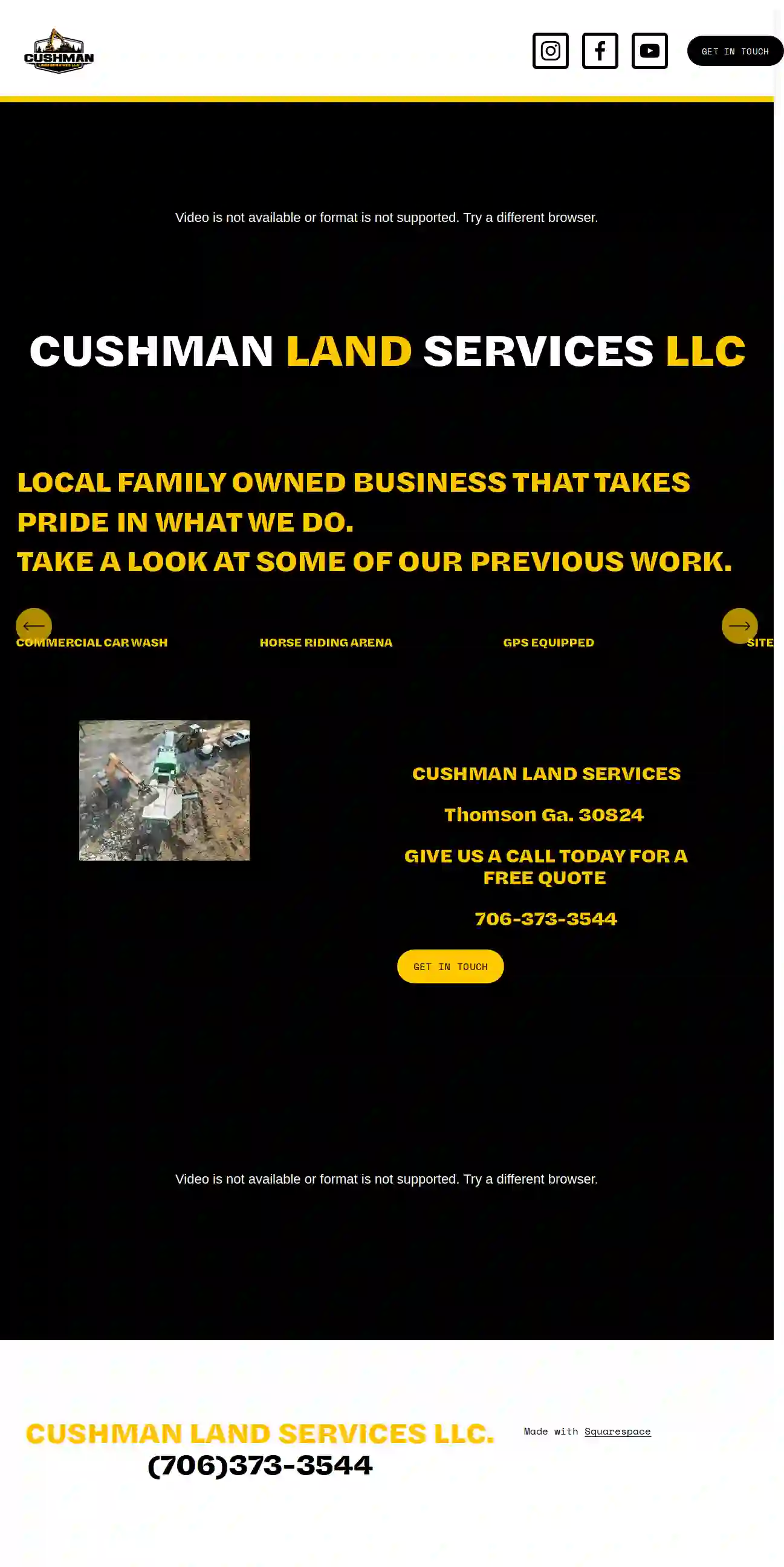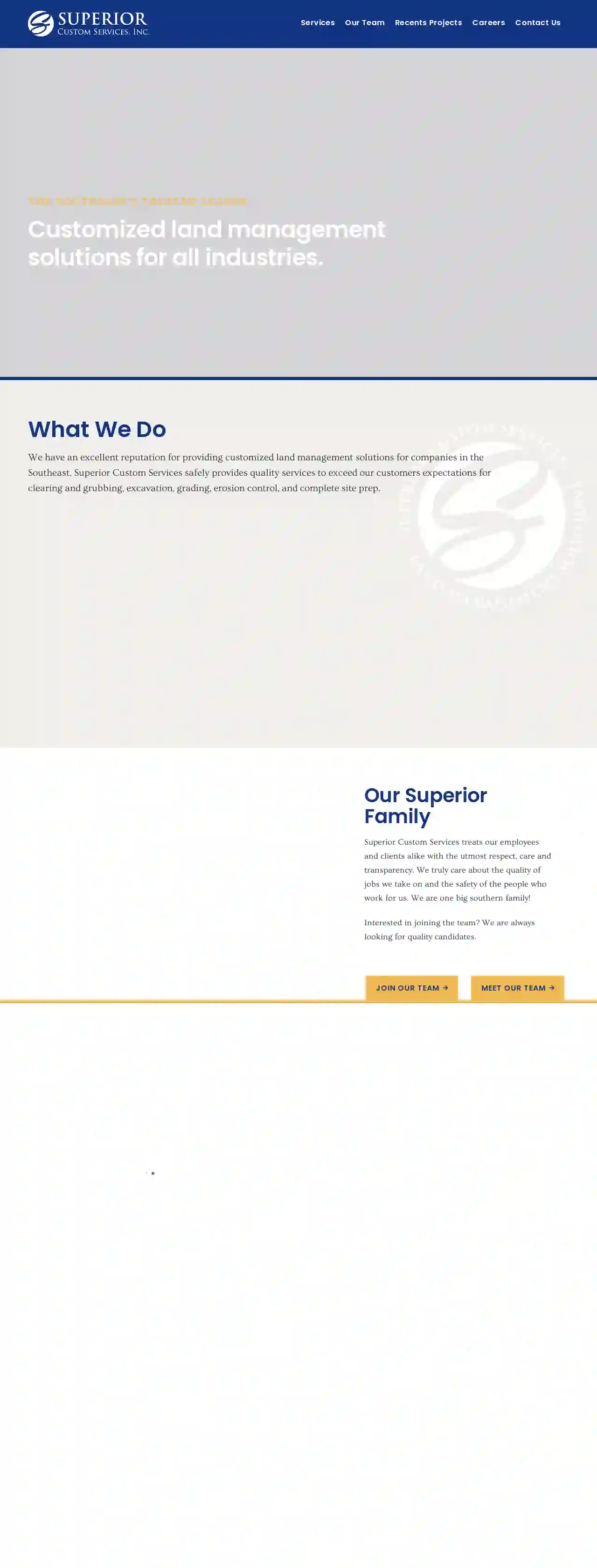Dirt Contractors Augusta
Top 10 Dirt Hauling in Augusta
Get multiple Dirt Hauling quotes for your project today! Compare profiles, reviews, accreditations, portfolio, etc... and choose the best service.

Cushman Land Services
1Augusta, US- Services
- Why Us?
Get Quote
Superior Custom Services Inc.
412 reviews310 Waco Drive, Suite 1, Sandersville, 31082, USSuperior Custom Services: Your Trusted Partner for Land Management Solutions Superior Custom Services is a leading provider of customized land management solutions for companies across the Southeast. We have a proven track record of delivering safe, high-quality services that exceed our clients' expectations. Our team of experienced professionals and comprehensive equipment fleet allow us to handle a wide range of projects, from clearing and grubbing to excavation, grading, erosion control, and complete site preparation. We are committed to providing our clients with the highest level of service and support. We believe in building strong relationships with our clients and working closely with them to achieve their goals. Our team is dedicated to safety and environmental responsibility, and we are committed to operating in a sustainable manner. We are proud to serve a diverse range of industries, including: Commercial Industrial Mining Residential We are confident that we can provide you with the land management solutions you need to succeed. Contact us today to learn more about our services.
- Services
- Why Us?
- Our Team
- Gallery
Get Quote
Over 3,943+ Excavation Businesses on our platform
Our excavation providers operate in Augusta & surroundings!
ExcavationHQ has curated and vetted the Best Excavation Pros in and around Augusta. Find the most trustworthy contractor today.
Frequently Asked Questions About Dirt Contractors
- Large-Scale Excavation: Assessing soil conditions, designing slopes, and ensuring stability for large excavation projects.
- Foundation Design: Determining the appropriate foundation type and depth based on soil bearing capacity and other factors.
- Retaining Walls: Designing retaining walls to stabilize slopes, prevent erosion, or create level areas on sloped sites.
- Slope Stability Analysis: Evaluating the stability of slopes and recommending measures to prevent landslides or erosion.
- Contaminated Soil Remediation: Developing and implementing plans to clean up contaminated soil.
- Excavators: Versatile machines with a digging arm and bucket, used for excavation, trenching, loading trucks, and demolition.
- Bulldozers: Heavy machines with a large blade at the front, used for pushing and moving dirt, clearing land, and grading.
- Skid Steers: Compact, versatile machines with various attachments, including buckets, forks, and augers, used for digging, loading, grading, and more.
- Dump Trucks: Heavy-duty trucks designed for hauling dirt, gravel, and other bulk materials. Sizes vary based on carrying capacity.
- Graders: Machines with a long blade used for precise leveling and shaping of land surfaces, often used for road construction and site preparation.
- Compactors: Equipment used to compress soil, including plate compactors, rollers, and vibratory tampers, essential for achieving soil stability.
- Erosion Control: Implement measures to prevent soil erosion during and after excavation, grading, or dirt removal. This includes using silt fences, erosion control blankets, or planting vegetation to stabilize the soil.
- Soil Conservation: Preserve existing topsoil whenever possible, as it's a valuable resource for plant growth. Strip and stockpile topsoil separately for reuse in landscaping or gardening.
- Responsible Waste Management: Dispose of excess dirt, debris, and contaminated soil responsibly at designated facilities. Recycle materials whenever possible to reduce waste sent to landfills.
- Dust Control: Minimize dust generation during excavation and hauling by using water sprays, misting systems, or other dust suppression techniques.
- Noise Reduction: Use noise-reducing equipment and schedule noisy activities during permitted hours to minimize disturbance to neighbors and wildlife.
What is the difference between screened topsoil and unscreened topsoil?
Screened Topsoil: Processed through a screening machine to remove large debris, rocks, and clumps, resulting in a finer and more uniform texture. It's generally considered higher quality and is preferred for landscaping, gardening, and lawn establishment.
Unscreened Topsoil: Not processed through a screening machine and may contain various sizes of debris, rocks, and clumps. It's typically less expensive than screened topsoil but may require additional work to remove debris before use.
Choosing between screened and unscreened topsoil depends on your project's specific needs and budget.
What is a soil engineer, and when might I need one?
What are some common dirt contracting equipment?
What are the environmental considerations for dirt contracting?
What is the difference between screened topsoil and unscreened topsoil?
Screened Topsoil: Processed through a screening machine to remove large debris, rocks, and clumps, resulting in a finer and more uniform texture. It's generally considered higher quality and is preferred for landscaping, gardening, and lawn establishment.
Unscreened Topsoil: Not processed through a screening machine and may contain various sizes of debris, rocks, and clumps. It's typically less expensive than screened topsoil but may require additional work to remove debris before use.
Choosing between screened and unscreened topsoil depends on your project's specific needs and budget.
What is a soil engineer, and when might I need one?
- Large-Scale Excavation: Assessing soil conditions, designing slopes, and ensuring stability for large excavation projects.
- Foundation Design: Determining the appropriate foundation type and depth based on soil bearing capacity and other factors.
- Retaining Walls: Designing retaining walls to stabilize slopes, prevent erosion, or create level areas on sloped sites.
- Slope Stability Analysis: Evaluating the stability of slopes and recommending measures to prevent landslides or erosion.
- Contaminated Soil Remediation: Developing and implementing plans to clean up contaminated soil.
What are some common dirt contracting equipment?
- Excavators: Versatile machines with a digging arm and bucket, used for excavation, trenching, loading trucks, and demolition.
- Bulldozers: Heavy machines with a large blade at the front, used for pushing and moving dirt, clearing land, and grading.
- Skid Steers: Compact, versatile machines with various attachments, including buckets, forks, and augers, used for digging, loading, grading, and more.
- Dump Trucks: Heavy-duty trucks designed for hauling dirt, gravel, and other bulk materials. Sizes vary based on carrying capacity.
- Graders: Machines with a long blade used for precise leveling and shaping of land surfaces, often used for road construction and site preparation.
- Compactors: Equipment used to compress soil, including plate compactors, rollers, and vibratory tampers, essential for achieving soil stability.
What are the environmental considerations for dirt contracting?
- Erosion Control: Implement measures to prevent soil erosion during and after excavation, grading, or dirt removal. This includes using silt fences, erosion control blankets, or planting vegetation to stabilize the soil.
- Soil Conservation: Preserve existing topsoil whenever possible, as it's a valuable resource for plant growth. Strip and stockpile topsoil separately for reuse in landscaping or gardening.
- Responsible Waste Management: Dispose of excess dirt, debris, and contaminated soil responsibly at designated facilities. Recycle materials whenever possible to reduce waste sent to landfills.
- Dust Control: Minimize dust generation during excavation and hauling by using water sprays, misting systems, or other dust suppression techniques.
- Noise Reduction: Use noise-reducing equipment and schedule noisy activities during permitted hours to minimize disturbance to neighbors and wildlife.